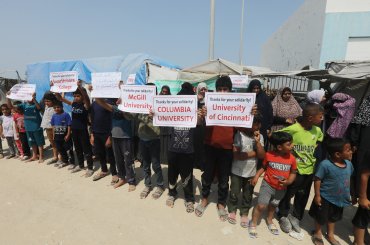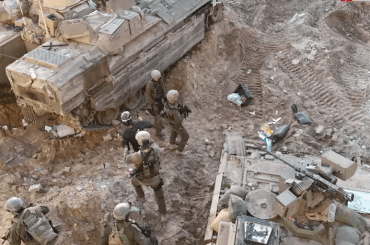A Review of Noga Kadman’s Erased from Space and Consciousness: Israel and the Depopulated Palestinian Villages of 1948 (Indiana University Press, 2015, Kindle Edition)
(I) Introduction:
Noga Kadman’s pioneering work is a timely and significant contribution to knowledge about settler colonialism in general and about the Zionist brand of it practiced in Palestine in particular. She opens her thoroughly referenced research report with the following most appropriate epitaph from Amos Kenan’s “The First”:
Look at the landscape around you, and carve it onto your memory. You must change it, . . . You must mercilessly destroy anything in the landscape which is not directly related to you. . . . Tell everyone that you were here first. … Tell them there was nothing before you. …

Kadman then starts her frank and well-informed discourse with an introduction that exposes the still-ongoing process of physical exiling of the Palestinians. She gives the charged issue full force by offering a wide range of documentation throughout the book while not shying away from strikingly poignant images. In her introduction, for example, she reverts to her own childhood memories of visiting the picturesque ruins of Lifta “in an anemone-sprinkled hill near Jerusalem.”
[The] bustling daily life, full of voices and colors, children, housework, livestock, water drawn from the well— all replaced today by emptiness and silence. And there is no commemoration or even reference to the world that has been lost and the circumstances of its disappearance.
Kadman pulls no punches in reporting her research. Here she goes on to explain that
The State of Israel, to a large extent, has been built and developed on the ruins of [over four hundred] Palestinian villages and [eleven] cities.
In his foreword to the report Oren Yiftachel, concurs with this judgment:
Kadman’s research joins a small number of studies that courageously seek to remove the mask of daily denial of the Palestinian exile, which grips not only Jewish society at large and its consensus-seeking leaders but also its academic and research institutions, which are supposed to pursue historical truth.
In her introduction Kadman outlines the contents of her book’s five interrelated chapters disclosing the details of the physical erasure of Palestinian villages during and after the Nakba of 1948. Furthermore she shows details of the erasure from Israeli consciousness in line with Kenan’s admonition in the epitaph.
(II) Shortcomings:
Balancing act: Kadman allows herself to lecture the reader on the need for mutual understanding in light of the two sides’ “mutual” disregard of each other’s narrative:
[O]ne of the Israeli-Palestinian conflict’s most poignant and persistent features is the utter unwillingness of either side to listen to the other’s perception of the disputed territory and its version of the history of the conflict, to understand the distress and the losses suffered by the other, and to accept responsibility for complicity in causing them. Without a change in these attitudes, there can be no reconciliation, and therefore no realistic, comprehensive, and long-term resolution of a national conflict.
Yiftachel seems to concur with the admonition. First, in his foreword, he sums up the process of erasure:
The act of erasure has been guided for decades by the mechanisms of the Jewish state, which seek to expunge the remains of the Arab-Palestinian society living in the country until 1948, as well as deny the tragedy visited on this people by Zionism. The act of erasure, which followed the violence, the flight, the expulsion, and the demolition of villages, is prominent in most major discursive arenas …
Then, as if to give counterweight to the flagrant physical and mental violence of Israel, he levels the following charge against the Palestinians:
Palestinian society, on the other hand, portrays a romantic image of a lost paradise and (in part) refuses to recognize the millions of Jews who settled in Israel and created a new vibrant society on the same ruined Palestinian space.
Omission: No where in the book is it mentioned that Kenan, the author of the succinct epitaph, before he attained his iconic status as leftist writer, had participated in the two most gruesome massacres of Palestinian civilians: Dayr Yasin and al-Dawayima. Both massacres were intended to frighten other Palestinians so they would flee the advance of the Jewish forces. This was an essential mechanism for the ethnic cleansing of Palestinians and the erasure of their villages, the very subject under discussion.
(III) Analysis:
There is no doubt that the book deals with an entirely unilateral process. Israel erased Palestinian villages physically and continues actively to negate any mention of them in Israeli civilized discourse and legitimate memory as both Kadman and Yiftachel assert repeatedly. No similar accusation can be leveled against the Palestinians. Yet both scientists seem compelled to assume a stand of neutrality.
And the Holocaust is marshaled repeatedly into the discussion as well to hoodwink doubters. Raef Zreik*, an authority on international law, makes the argument that I simplify here: The eminent threat of drowning at sea gives one a moral right to be saved by any boatman who happens on the scene. But it doesn’t give the drowning person the legal right to climb on my boat against my will and then to throw me overboard.
For a veteran of the ‘Israel Defense Forces,’ the very same culprit of all the evil that Kadman’s book exposes and condemns so thoroughly, to straddle the neutrality fence and proceed to lecture both sides on the subject of peace and reconciliation makes little ethical sense. I never could put up with the falsity of ‘shooting and crying.’ For the two experts to assume neutrality between displaced and displacer while physically, nationally, politically and socially continuing to be situated on one side is logically and morally untenable. Some historians, when faced with such dilemmas, chose sides.
And Kadman’s omission of any qualification of her quote from Kenan is unforgivable especially given the repeated mention that she makes of the two locales of the massacres in which he had participated. It reeks of the dehumanization of the victims. But, given the Israeli ‘accepted’ frame of reference and the ‘normalization’ among public figures of war criminality, whether historically in 1948 or recently in Gaza, why should Kenan be singled out for such notoriety, one may ask?
(IV) Conclusion:
I agree with Yiftachel’s assertion that:
[The Book] explores a fascinating geographical, political, and psychological phenomenon that sheds light on the mechanisms through which one ethnic space is being erased and replaced by another.
It is sad that such a bright scientific light dims a tad at its moral and philosophical edges.
* Raef Zreik: Notes on the Value of Theory: Readings in the Law of Return—A Polemic; Law & Ethics of Human Rights, V 2, Issue 1, 2008.



Tribes have been warring against each other for millenia. That includes attacking, destroying, and utterly annihilating any traces of them and obliterating them from consciousness (how else could we live with ourselves?). It was an important accelerant of human evolution, and history is little more than a chronicle of these events. Nazi Germany is an example of this. Zio-fascism is another example, though being performed in excruciating slow motion. Trumpkinism is another incipient (though doomed) form of it. It’s all very exciting and instructive to watch this ancient practice meet its well-deserved end. (Congrats people – we did it!)
Sad news from the UK!!. Death of Gerald Kaufman.
““I was brought up as an Orthodox Jew and a Zionist. On a shelf in our kitchen, there was a tin box for the Jewish National Fund, into which we put coins to help the pioneers building a Jewish presence in Palestine,” Kaufman began.
“My parents came to Britain as refugees from Poland. Most of their families were subsequently murdered by the Nazis in the Holocaust,” he recounted. “My grandmother was ill in bed when the Nazis came to her home town of Staszow. A German soldier shot her dead in her bed.”
“My grandmother did not die to provide cover for Israeli soldiers murdering Palestinian grandmothers in Gaza,” Kaufman said.
Kaufman went on to accuse Israeli military spokesperson Avital Leibovich of giving “the reply of a Nazi” when she said in answer to a TV interviewer that most of the Palestinians killed were “militants.”
“I suppose that the Jews fighting for their lives in the Warsaw Ghetto could have been dismissed as militants,” Kaufman said.
“Israel was born out of Jewish terrorism,” Kaufman reminded fellow lawmakers, referring specifically to the notorious 1948 massacre by Zionist militias of Palestinians in the village of Deir Yassin.
“It is time for our government to make clear to the Israeli government that their conduct and policies are unacceptable, and to impose a total arms ban on Israel,” Kaufman concluded. “It is time for peace, but real peace, not the solution by conquest which is the Israelis’ real goal but which it is impossible for them to achieve. They are not simply war criminals; they are fools.”
read more at !!.
https://electronicintifada.net/blogs/ali-abunimah/gerald-kaufman-jewish-uk-lawmaker-and-fierce-israel-critic-dies-86
Rest In Peace , Gerald Kaufman . A noble , brave and gentle soul .
Great sadness at his leaving us .
Thank you very much for this. I greatly appreciate this review, as I was anticipating reading this book. Although not straight away, as I have a considerable backlog at the moment.
It’s disappointing that there is an attempt at a middle ground fallacy. There is no comparison here, you can’t tell a victim to try and understand why someone victimized them. Even if we do, it doesn’t justify anything. Palestinian society deny the Israeli narrative out of resistance and survival, and because it is full of holes and propaganda used to legitimize settler colonialism in the 20th century.
Israeli society deny the Palestinian narrative because it pokes holes in their story, it shows that they are all guilty and live off of Palestinian misery. It is denied in an attempt to maintain superiority over an entire people. There is no equivalence between these two forms of denial.
At the very least, it seems that the historic and data related aspects of the book are of good quality. This is what interested me the most in the book, not the author’s position.
Think of it, the several academic works by intellectuals of the Zionist invaders, appearing to acknowledge facts that have been suppressed from wider awareness while they perform Zionist propaganda for invasion and genocide, are more reason to call for full, undiscounted academic boycott of the Zionist entity.
These Zionist propaganda pieces won’t be missed. They can be re-done properly, without the propaganda, by others outside the Zionist system.